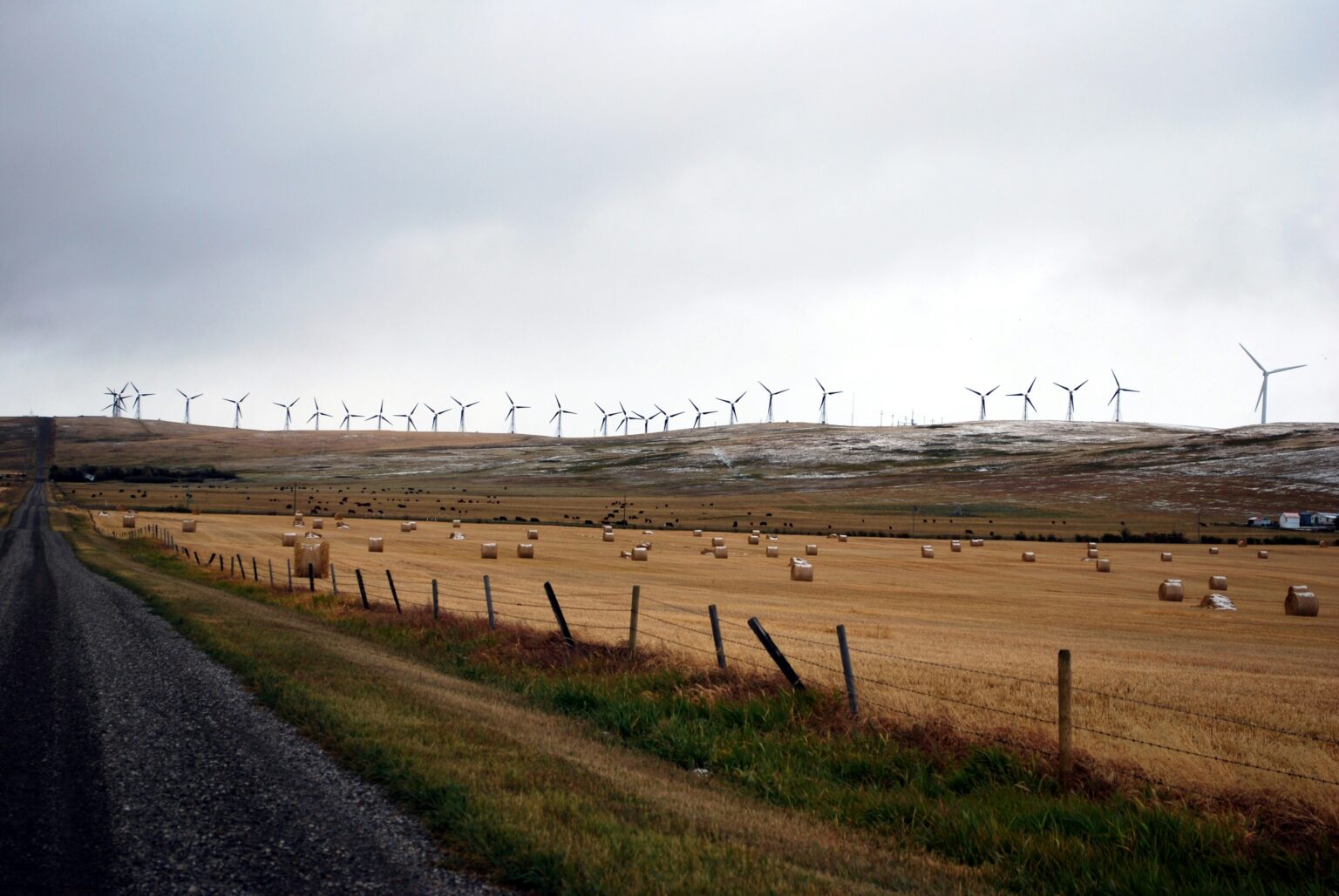A new report issued by the Alberta Utilities Commission has confirmed what environmentalists have been saying all along: renewable energy systems are not a threat to the environment or agriculture.
The report was issued two weeks after Alberta Premier Danielle Smith lifted a moratorium on new renewable energy development in the province. Smith, a well-known climate change denier and fossil fuel sector advocater, nonetheless announced a series of new regulations critics say would ban wind turbines from much of the southern half of the province.
The report indicates that, even if all new renewable energy development were to occur on the province’s highest quality land, the estimated percentage of that land that would be lost would be less than one percent by 2041.
Smith’s United Conservative Party (UCP) government tasked the utilities commission with delivering a report on Alberta’s renewables sector, which was booming up until the moratorium went into effect in August of 2023. While Alberta has long been known as the centre of Canada’s oil and gas industry, what is perhaps less known is that province is ideally suited for wind and solar power projects, owing to ample sunlight and steady wind.
Renewable energy experts speaking on both the environmental and economic impact of the moratorium and subsequent regulations described the Alberta government’s decisions as being ideologically motivated. They have further described the new regulations as a soft moratorium. Experts estimate these anti-renewables efforts have put 6,000 jobs at risk, and threaten the viability of $33 billion worth of renewable energy projects.
DeSmog contributor Geoff Dembicki reported that a climate change denying, anti-renewable energy group called Wind Concerns had at least one private meeting with Premier Smith. The founder of the organization, Mark Mallett, has called carbon dioxide the “gas of life,” among other baseless and unscientific claims.
Risky Fossil Fuels
Though the Alberta Utilities Commission’s (AUC) report may vindicate environmentalists and renewable energy advocates, it is unlikely to have any immediate positive impact on the renewables sector in Alberta.
“There is still lots of uncertainty holding back investment in Alberta – the government’s policy announcement left out many details that may prevent regulatory approval decisions for months still,” said Jason Wang, senior analyst for the Pembina Institute’s electricity program.
“Conventional oil and gas uses 125 times as much land and has at least 115 times greater liabilities,” said Wang, who added, “a moratorium was not necessary to develop new regulations.”
This view is shared by Ruiping Luo, a conservation specialist with the Alberta Wilderness Association.
“I would not expect a full resumption of renewables development,” said Luo in an interview with DeSmog. “The large 35-km buffer that has been proposed (around wind power projects) severely limits wind development, and the uncertainty around other regulations, including the still undefined ‘pristine landscapes,’ is likely to perpetuate the uncertainty about the future of renewable energy in Alberta started by the moratorium.”
As reported by the Canadian Press, the utilities commission’s report determined what had already been widely known by experts in the field: renewables have low, well-understood, and contained, reclamation risks. Further risks of groundwater and off-site contamination are also low.
Wang says the commission’s data and observations confirmed that when it comes to agricultural land — a key focus of the report and one of Smith’s regular talking points — renewables were far less impactful than suburban sprawl and continued fossil fuel development.
The report states “From 2019 to 2021, the largest driver of agricultural land loss was expansion of pipelines and industrial sites.” The report further cited mines, wells, and roads as being responsible for the province’s loss of agricultural land.
If the Smith government were to reverse course and encourage renewables development, Luo says solar and wind power could become immensely beneficial for the province’s wilderness and wildlife.
“Renewable energy is far less damaging to the environment and wildlife than fossil fuels,” said Luo.
“Comparatively, fossil fuel generators kill over 15 times more birds than renewable energy generators. Many more species are at risk due to climate change, and fossil fuels account for the majority of the world’s climate change emissions. Fossil fuel extraction has already left scars throughout Alberta, where the ecosystems and species may never recover.”
Report ‘Cherry Picked’
While Luo notes care must still be taken to ensure renewable energy projects are sited appropriately, such that they avoid areas of high biodiversity or sensitive ecosystems, renewables still pose far less of a threat than continued fossil fuel exploration and exploitation.
Martin Olszynski, an environmental law expert and professor at the University of Calgary, echoed Luo.
“Renewables are nowhere near the threat that the UCP have made them out to be — not to agriculture, the environment, nor Alberta’s viewscapes. Indeed, they are far less a threat than other industrial forms of development, including conventional oil and gas that currently represents a $30-60 billion liability on the landscape.”
Olszynski pointed out other problems with Smith’s moratorium as much as the subsequent regulations, problems that were underlined by the report. These include the commission’s observation that existing regulations were sufficient to ensure the protection of agricultural land, that there was no consensus on what constituted “prime” agricultural land in Alberta, and that market forces already favored non-prime agricultural land for the development of renewable energy projects.
Since the report was made available to the UCP government at the end of January — a full month before Smith ended the moratorium and introduced restrictive new regulations on renewables, Olszynski says he believes that the Smith administration has already essentially disregarded the content of the commission’s report.
“The AUC did great work, summarized the facts and evidence, made thoughtful observations, and presented a range of options, identifying pros and cons. The UCP cherry picked the worst options as their preferred policy.”
Requests for comment from the premier’s office were not returned.
Despite this, Olszynski tries to remain hopeful.
“That February 29 announcement was very vague, with lots of details to be fleshed out. So we can perhaps hope that, having given some faction of their base the splashy attack on renewables that they demanded, cooler and more rational heads will prevail in the more staid, regulatory development ahead.”
Subscribe to our newsletter
Stay up to date with DeSmog news and alerts







